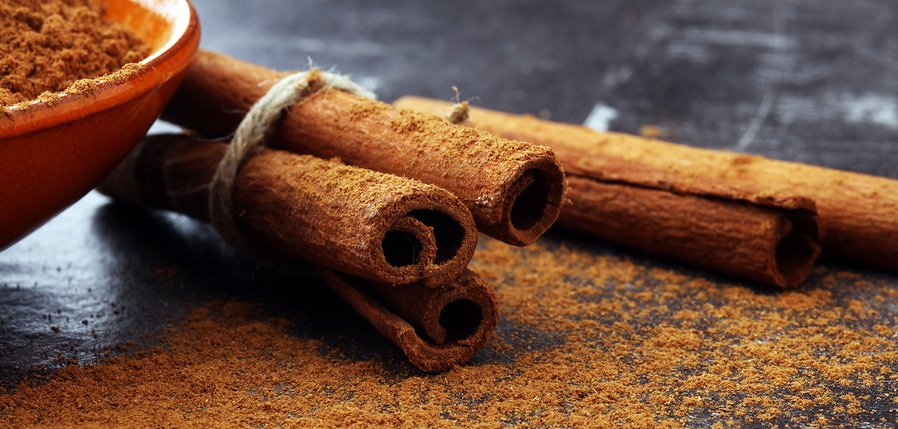Many of us complain that our metabolism just isn’t what it used to be. At a younger age, it might not have been so difficult to lose a few excess pounds by cutting back on calories for a week or two. But now, it may feel like even though you work hard to eat nutritiously and avoid the junk food, the number on the scale barely budges. But cheer up! It might be possible to rev up your metabolism naturally by adding some spice to your life. According to new research, the answer could be as simple as adding cinnamon to your daily menu.
The study, which was conducted at the University of Michigan in Ann Arbor, found that cinnamon may have the ability to increase metabolism in fat cells.1 Jiang, Juan; et al. “Cinnamaldehyde induces fat cell-autonomous thermogenesis and metabolic reprogramming.” Metabolism. December 2017. Accessed 3 December 2017. http://www.sciencedirect.com/science/article/pii/S0026049517302123. For the experiment, adipocytes, or fat cells, were taken from both laboratory mice and four human subjects who had undergone liposuction.
The adipocytes were then exposed to cinnamaldehyde, which is the compound in cinnamon that provides its distinct flavor. The addition of cinnamaldehyde produced an increase in thermogenesis, or the process of calorie burning in cells to produce heat. It triggered greater activity within specific genes and higher production of certain proteins that contribute to fat burning.
Fat cells serve an important purpose from an evolutionary perspective. They are a storage area for lipids, which provide a good source of energy that could be put to use when food was scarce or to help the body generate sufficient heat when there was little protection from the cold. However, in most parts of the world, these are not problems we encounter any longer. What’s more, the lack of manual labor and the reduced need to walk far distances as did our ancestors, coupled with the huge upsurge in processed foods full of empty calories in recent decades, have created an overabundance of fat stores. In the U.S., that translates to nearly 71 percent of adults 20 or older who are currently overweight or obese.
Unfortunately, based on the design of this research, we can’t say conclusively that consuming cinnamon will promote a more efficient metabolism in people. That’s because the experiment was mainly conducted on mice, with only four human subjects. We know that results do not always correlate between species, so what works for mice may be very different in us.
In addition, the cells that were exposed to cinnamaldehyde—even those from people—were all outside of the body. So while it’s intriguing that the spice could have these effects on cellular metabolism, the study does not take into account how the findings might be affected by other factors and processes within the body that could perhaps alter or even obliterate these results.
On the other hand, it is entirely possible that cinnamon could produce the same effect on adipocytes within the body as it was shown to do in a lab environment. After all, cinnamon was found in a 2014 study at the University of Tuebingen in Germany to help lower blood glucose levels, improve insulin sensitivity, and decrease fat in the liver.2 Sartorius, Tina; et al. “Cinnamon Extract Improves Insulin Sensitivity in the Brain and Lowers Liver Fat in Mouse Models of Obesity.” PLoS One. 18 March 2014. Accessed 4 December 2017. http://journals.plos.org/plosone/article?id=10.1371/journal.pone.0092358.
Since cinnamon is natural and adds wonderful flavor to dishes, there is really no downside to increasing your intake especially if it can boost your metabolism to some degree. Just take care to consume your cinnamon in healthy ways. Unfortunately, it is a very popular spice in all kinds of confections from donuts to sugary glazed buns to coffee cakes. While all of these might offer a delicious cinnamon taste, they are clearly going to add more than enough empty calories to counteract any benefits from the spice.
Instead, try putting cinnamon on your oatmeal, in curries, and on sweet potatoes. There are lots of healthy ways to get a daily dose of cinnamon, adding rich flavor and hopefully improving your metabolism along the way. If you don’t love the flavor of cinnamon or have an allergy to the spice, you can still reap a set of related benefits by taking a natural supplement that contains Cinnulin PF extract, which is actually up to 700 percent more effective than cinnamon itself in improving the body’s insulin response.
References
| ↑1 | Jiang, Juan; et al. “Cinnamaldehyde induces fat cell-autonomous thermogenesis and metabolic reprogramming.” Metabolism. December 2017. Accessed 3 December 2017. http://www.sciencedirect.com/science/article/pii/S0026049517302123. |
|---|---|
| ↑2 | Sartorius, Tina; et al. “Cinnamon Extract Improves Insulin Sensitivity in the Brain and Lowers Liver Fat in Mouse Models of Obesity.” PLoS One. 18 March 2014. Accessed 4 December 2017. http://journals.plos.org/plosone/article?id=10.1371/journal.pone.0092358. |












You can also make cinnamon
You can also make cinnamon tea:2 teaspoons of cinnamon add little ginger and organic lemon and raw honey. It’s a great drink!
There are different types of
There are different types of Cinnamon; Ceylon has good Cinnamon; the Trees themselves produce the Cinnamon Bark;
there are a number of
there are a number of websites warning against using Cassia Cinnamon and recommending only Ceylon cinnamon.
They say cassia type is high in coumadin-like ingredient…is this correct, Jon?
I’ve been following you for a
I’ve been following you for a few years, read your book and keep all your emails. Just a comment about this latest article: High blood sugar and excess weight are always combined. It’s the case in most books I read about the subject. I’m a thin person with somewhat higher than normal blood sugar. I’m doing all the right things, eating healthy exercising daily etc. Is there any good advise for me that doesn’t involve losing weight? Thanks, Dan
Absolutely! Did you read
Absolutely! Did you read this article? https://jonbarron.org/article/diabetes-cholesterol-blood-pressure-and-life-extension